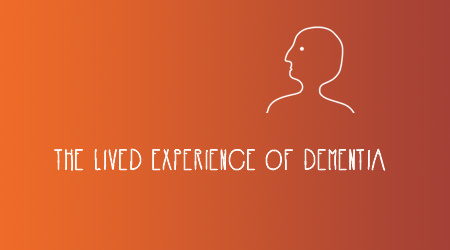An introduction to The Lived Experience of Dementia
The Centre for Applied Dementia Studies at the University of Bradford is conducting a research project regarding your experience of using the elearning for healthcare dementia programmes. This evaluation aims to find out your thoughts on the dementia sessions and the impact the training has had on your knowledge and practice. If you would like to take part in the evaluation, we are asking you to complete a short survey before completing a session and another short survey after completing your session. There will be separate surveys for each session you complete. We will also be conducting telephone interviews with up to 20 people with regards to how the sessions have had an impact on practice. For further information please contact Dr Janet McNally.
About The Lived Experience of Dementia
This programme is aimed at all staff working in health and social care settings, providing a unique insight into the lived experience of dementia, increasing knowledge and understanding of the condition.
It covers some of the learning outcomes from the Dementia Training Standards Framework and can support other learning materials covering Tier 2 standards.
Understanding the lived experience of dementia enables health and social care staff to develop a deeper appreciation of the challenges of living with dementia, focusing attention on the things that make us feel human. Treating others in a humanistic way can not only strengthen relationships with the people we care for, but also with those who we work alongside.
There are lots of educational materials on caring for people with dementia available, and if you are working for a health or social care organisation you may have already received some information. Or this may be the start of your caring career.
Either way, whether you work in an acute hospital, in the community or in a residential home setting, this programme will help you to see beyond the diagnosis of dementia, increase your understanding of the lived experience of the condition and ultimately improve the quality of care you deliver.
Sessions
The Lived Experience of Dementia is split into four bite-sized sessions, starting with an introduction to a ‘humanised approach to care’ which we will reference throughout the programme.
Each session should take around 30 minutes and you should work through each one in turn, building your understanding of dementia and the ways in which you can support the people you care for as you go.
Our contributors
In addition to hearing from experts at Bournemouth University’s Ageing and Dementia Research Centre, this programme features insights from:
Nurses and carers working closely with people who have dementia
Professor Seb Crutch at the UCL Dementia Research Centre
Trina, who is living with a rare form of dementia called posterior cortical atrophy, and her husband Graeme
These insights and real-world examples of humanising care will encourage you to consider how you can best support people with dementia in your role, while developing your understanding of the physical processes that underlie the symptoms.
We are extremely grateful to everyone who has helped shape this programme by sharing their experiences.
A Walk Through Dementia
This programme is built around Alzheimer’s Research UK’s A Walk Through Dementia app. A Walk Through Dementia is the first time a smartphone app has been used to engage the public with a first-person experience of dementia.
Developed in partnership with people with dementia and their carers, the experience is designed to help the user think beyond memory loss to gain a fully immersive insight into the varied symptoms people with dementia can experience in everyday life.

Dr Michele Board
Principal Academic in Nursing and Older People, Bournemouth University
Karen Cooper
Lecturer in Adult Nursing, Bournemouth University
Iain Fossey
Communications Manager, Alzheimer’s Research UK
Emma Nye
Project Manager, HEE elearning for healthcare
Stephen Gibbons
Learning Designer, HEE elearning for healthcare






